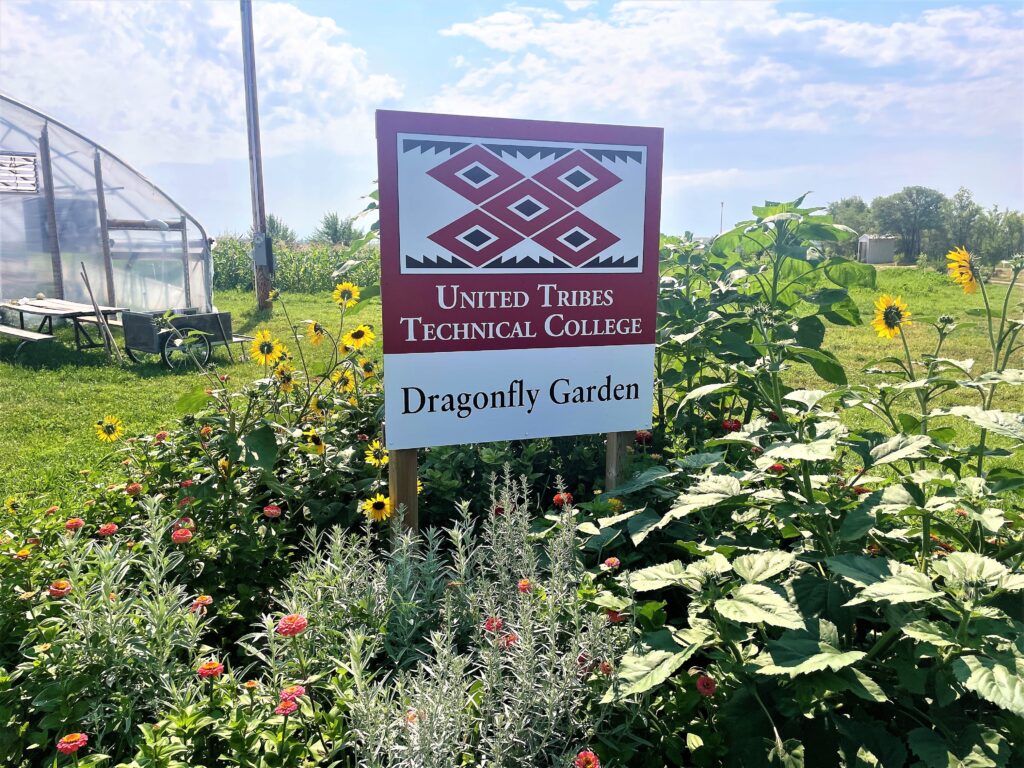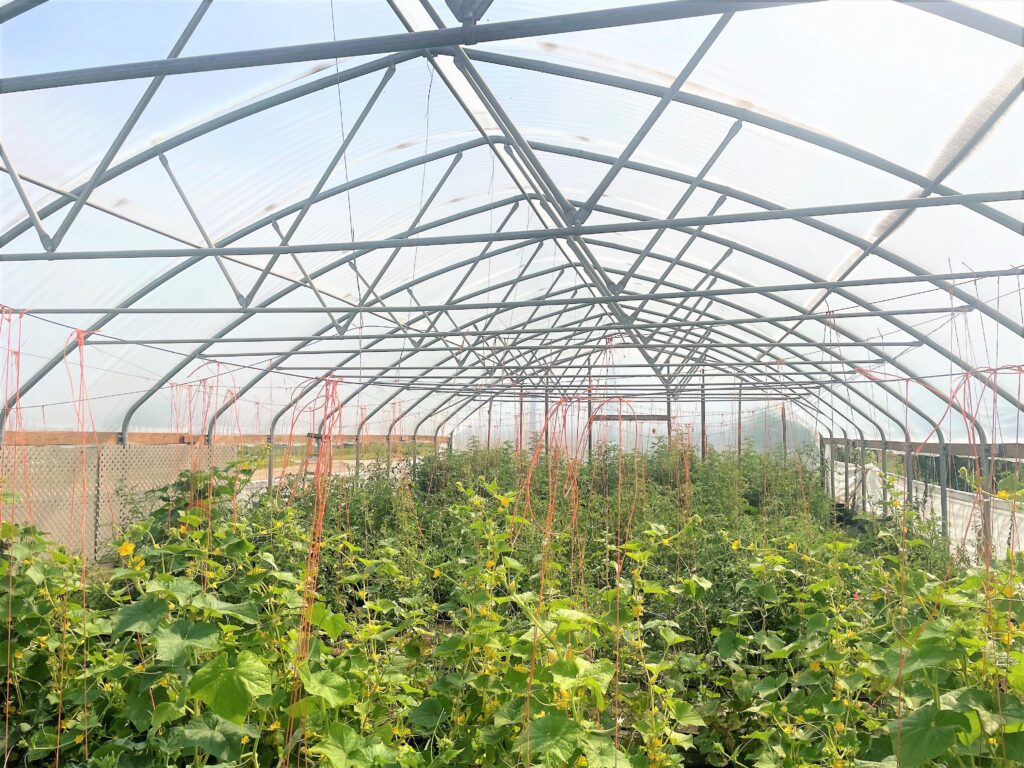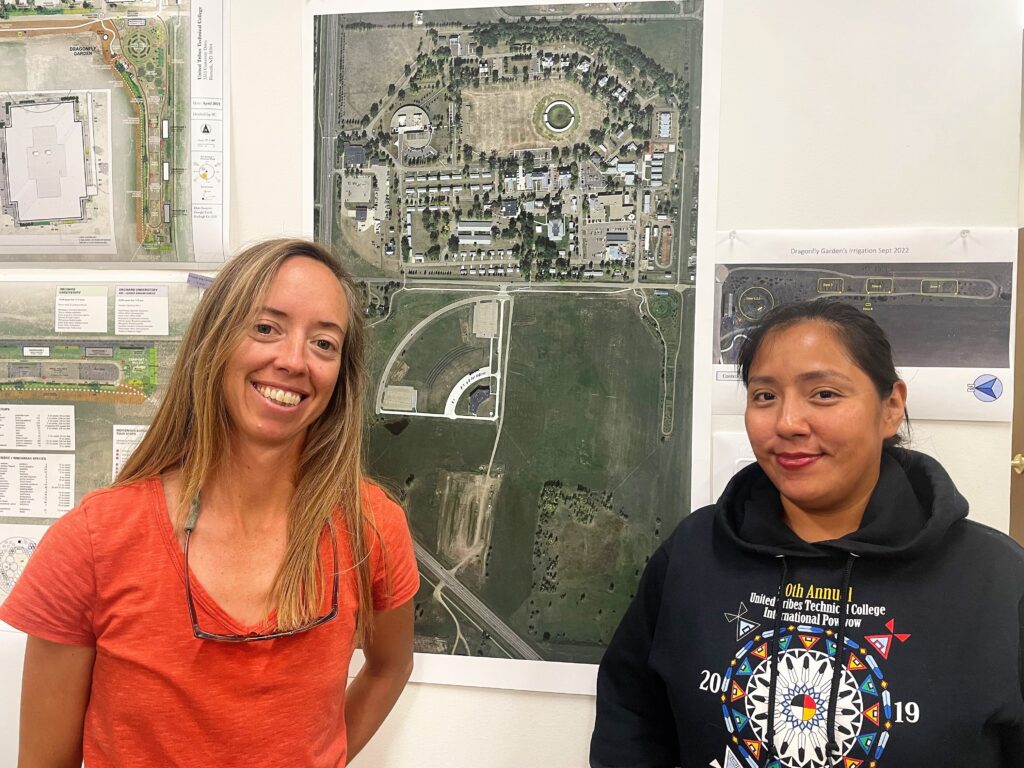The billboard project is expanding to Oregon

Emily Running Hawk tends to squash growing in the Dragonfly Garden at United Tribes Technical College. Photo by Adrianna Adame
Tending to the plants in the field, she bends to examine the progress of each squash. Though she prefers caring for the tomatoes in the greenhouse, she doesn’t mind working outside in the garden.
Emily Running Hawk is a second-year student in Sustainable Agriculture and Food Systems Applied Science at the United Tribes Technical College. She is remaining on the UTTC campus for her summer internship, nurturing the Dragonfly Garden.
“My nails get dirty a lot but that’s fine, I like [working with] the tomatoes, it gives me time to think about myself and think about the day, and I often find myself praying,” said Running Hawk. “I talk to the plants when I’m alone. My son usually comes out with me to help in the garden where he can, or he’ll just run around in the field. But he likes to talk to the plants, too.”
The garden, which has evolved over time, is meant to educate the community about plants and food. The Sustainable Agriculture and Food Systems program on campus helps students learn about cultivating and harvesting.

Lindsey Aull, one of two Agroecology Extension Educators at UTTC, has been working on the greenhouse, which is a high tunnel or hoop house. She has been working with the Sustainable Agriculture and Food Systems program on the garden since 2020.
Prior to the revitalization campaign, the role of garden plots across campus was mainly decorative. Through a series of awards, UTTC’S Land Grant Department was able to expand the Dragonfly Garden to incorporate those plots into the sustainability curriculum.
While the college sells no produce, campus growers make sure higher value crops have front-row seats in the greenhouse. Cucumbers, tomatoes and hemp are set in the high tunnel. That way they are protected from temperature extremes and remain productive for longer periods.

Currently, the Land Grants Department is focusing on annuals – plants that grow and die in one season. In the future, they’d like to start planting more native stock and perennials – plants that regrow every season. One of the latest additions to the garden includes the native perennial sweetgrass.
While the Dragonfly Garden provides a way for students to learn about the importance of engaging with the natural world, it also teaches food sovereignty.
The curriculum mentions that food sovereignty is when those who produce and harvest their own food distribute it in their communities. For Running Hawk, her communities include both the Standing Rock Sioux Tribe and those at UTTC.
She wants to share knowledge about the planting process and let others know that you really are what you eat, she said.
“For me personally, what it has been and what I hope to impart to the students here is that you can provide for yourself and you can provide for other people,” Aull said.
Food sovereignty fosters connections within a community, they observe. Meanwhile, for Aull and Running Hawk, gardening is a healing process and relieves whatever is weighing on their minds.
“That’s why I do it too, that’s why almost everyone I know who does this kind of work does it – because somehow being out there makes you better as a person,” Aull said.

What’s more, the Sustainable Agriculture and Food Systems program aims to teach students life skills that they can apply in Indian Country. “I plan to take my knowledge home to the Standing Rock Sioux Tribe and to eventually get some greenhouses going,” Running Hawk said.
While these future greenhouses may not pop up all at once, she said, installing one high tunnel at a time could be a part of the healing process for her and her community.
Adrianna Adame
Former Indigenous Democracy Reporter
Location: Bismarck, North Dakota
See the journalist page© Buffalo's Fire. All rights reserved.
This article is not included in our Story Share & Care selection.The content may only be reproduced with permission from the Indigenous Media Freedom Alliance. Please see our content sharing guidelines.
Identification not yet made
UTTC International Powwow attendees share their rules for a fun and considerate event
Radio collaboration highlights importance of cooperation in a season of funding cuts for local media
A memorial in the Snow County Prison, now the United Tribes Technical College campus
Standing Rock Sioux Tribal Chairwoman Janet Alkire tells crowd, ‘We’re going to rely on each other’







